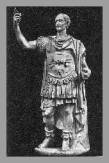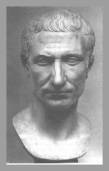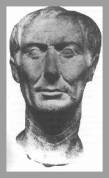Man, Soldier and Tyrant.
A brief review of Major General J.F.C. Fuller’s Book.
Introduction
 After writing the little article on the Russian campaign of 1812, and attempting to shoot a few holes in the myth of Napoleonic greatness I was both pleased and astonished at the response from younger visitors to this site who are keen to know more about the great military commanders of history. In particular I have received a number of requests to write an article dealing with Julius Caesar and his contribution to combined arms warfare. Not having the time at the moment to go into Caesar’s career in depth, I have nevertheless tried to evaluate his military status by using the very detailed analysis and research given in Major General J.F.C. Fullers work, ‘Julius Caesar, Man, Soldier and Tyrant.’ (Da Capo Press, paperback edition, 1965). I have also added a brief description of the military career of Scipio Africanus, for comparison and conjecture, using Basil Liddell Hart’s work. ‘Scipio Africanus, A Greater than Napoleon.’(Da Capo Press, paperback edition, 1996) I hope that this short essay will instil the reader with enough enthusiasm to find out more about Caesar’s exploits, and his handling of both the military and diplomatic problems that confronted him during his many campaigns.
After writing the little article on the Russian campaign of 1812, and attempting to shoot a few holes in the myth of Napoleonic greatness I was both pleased and astonished at the response from younger visitors to this site who are keen to know more about the great military commanders of history. In particular I have received a number of requests to write an article dealing with Julius Caesar and his contribution to combined arms warfare. Not having the time at the moment to go into Caesar’s career in depth, I have nevertheless tried to evaluate his military status by using the very detailed analysis and research given in Major General J.F.C. Fullers work, ‘Julius Caesar, Man, Soldier and Tyrant.’ (Da Capo Press, paperback edition, 1965). I have also added a brief description of the military career of Scipio Africanus, for comparison and conjecture, using Basil Liddell Hart’s work. ‘Scipio Africanus, A Greater than Napoleon.’(Da Capo Press, paperback edition, 1996) I hope that this short essay will instil the reader with enough enthusiasm to find out more about Caesar’s exploits, and his handling of both the military and diplomatic problems that confronted him during his many campaigns.
Caesar’s Career.
Could anyone have predicted that the youngest member of the triumvirate [1]The triumvirate consisted of Pompey, Crassus and Caesar. They virtually controlled the reins of power, and became a State within the State. See Fuller, page 68. would out-do Pompey, the renown military commander, and change the whole face of the then known world? With only a year’s military experience in Spain (61 BC), and already past forty years of age, Julius Caesar’s knowledge in military matters, to say nothing of his total lack of handling troops, was very limited. He was an intellectual, trained by Greek tutors, and an eloquent advocate in the Roman Forum. He was also, as were so many other Romans in history, a skilful manager of intrigues. His lavish lifestyle, his entertainments, and his debts were famous, and because he was the nephew of Marius and the son-in-law of Cinna [2]Gaius Marius, 157-86 BC. Lucius Cornelius Cinna, ?-84, his road to fame, glory and power was well paved.
 Major General J.F.C.Fuller (1878-1966) takes stock of the man in the above-mentioned work. Here one reads how, when Caesar was young, ‘he avoided quarrels, not because they aggravated the present trouble, but because they compromised the future.’ [3]Page, 51 This was the basic trait that ran through all Caesar’s dealings, both political and military, ‘It was always Caesar’s end in view that governed his behaviour; with him first things came first – why ruffle a potential enemy with invective or sarcasm, when a honeyed word tranquillized him.’ [4]Page, 51 Although we are dealing with military history on this site, it is important to grasp the character of the man, and Fuller goes to some lengths to define just what motivated Caesar in his rise to power, ‘He was a man totally governed by his end, and whether the means he employed to gain it were good or evil meant exactly nothing to him so long as he considered they would lead to success.’ [5]Page. 55
Major General J.F.C.Fuller (1878-1966) takes stock of the man in the above-mentioned work. Here one reads how, when Caesar was young, ‘he avoided quarrels, not because they aggravated the present trouble, but because they compromised the future.’ [3]Page, 51 This was the basic trait that ran through all Caesar’s dealings, both political and military, ‘It was always Caesar’s end in view that governed his behaviour; with him first things came first – why ruffle a potential enemy with invective or sarcasm, when a honeyed word tranquillized him.’ [4]Page, 51 Although we are dealing with military history on this site, it is important to grasp the character of the man, and Fuller goes to some lengths to define just what motivated Caesar in his rise to power, ‘He was a man totally governed by his end, and whether the means he employed to gain it were good or evil meant exactly nothing to him so long as he considered they would lead to success.’ [5]Page. 55
Caesar was born in an age of crumbling republican institutions, when new conquests and new wealth from all over the known world were undermining established Roman values. In a time when the state was at the mercy of ambitious commanders, who were struggling with one another for ultimate power, it is small wonder that the most ambitious and tenacious of them all-Caesar-came out on top. As a man he could be all things to all men, and during those times of Roman expansion one has to admit that if anyone was going to take-up the reins of power it was better to have a man of Caesar’s ambitions, tempered with a far- seeing need for reforms, and who’s tolerance and statesmanship was better than most of his contemporise, ‘Not peace but power was his aim, and it is understandable that until he had gained it, he was compelled to struggle for it within the vicious environment of his day.’ [6]Page, 312
As a soldier Fuller recognized Caesar as, ‘one of the greatest fighting generals of the Classical age.’ [7]Page, 324 However he also finds many faults with Caesar’s methods of warfare. Fuller agrees with the American military historian, Colonel Theodore Dodge, that most of Caesar’s campaigns were taken-up with, ‘extricating himself from the results of his own mistakes.’ [8]See Dodge, Colonel T. ‘Caesar, Great Captains Series,’ Volume II, page 767 Fuller goes further and extends his criticism of Caesar by asserting that, even though these extractions may in themselves have been brilliant, Caesar was guilty of poor generalship, ‘His defective system of supply frequently compelled him to change his area of operations to his disadvantage, his untrained, barbaric cavalry at times led him into critical situations; and when his enemy took to guerrilla warfare, he could do nothing to respond to him. It is astonishing that a soldier of his outstanding intelligence…could have failed to realise how defective was his army organisation.’ [9]Fuller, Page 318
 Now all this may be true, but Fuller seems to overlook the fact that the Roman army had no military training institutions, and no formal process of testing or for that matter educating officers in the problems of command. Caesar was no more defective in his military organisation than Frederick the Great, who also managed to extricate himself from the results of his own mistakes.
Now all this may be true, but Fuller seems to overlook the fact that the Roman army had no military training institutions, and no formal process of testing or for that matter educating officers in the problems of command. Caesar was no more defective in his military organisation than Frederick the Great, who also managed to extricate himself from the results of his own mistakes.
Fuller, who one must remember was an apostle of mobile tank warfare, also regards the Roman use of marching camps with contempt. He tells how so completely did the spade dominate tactics that the Roman legions seldom accepted battle unless there was an entrenched camp close at hand, and that this occurred to such a degree that most Roman campaigns could be described as nothing more than mobile trench warfare. It is Fuller’s conclusion that the lack of mobility induced by this practice rendered the legion system unsuited against guerrilla warfare. [10]Page, 86-87
I feel that Fuller is quite correct in his thinking concerning the provision of a strong and well-trained cavalry force as a compliment to the Roman legions. However, is Fuller correct in his judgement about the consequences of the lack of cavalry when he himself gives us a good reason to suggest otherwise by his own observation that, ‘a collateral factor which favoured the expansion of the empire was that, except in Parthia and to a lesser extent in Numidia, the legionnaires were never until the end of Rome’s supremacy, called upon to face efficient cavalry.’ [11]Page, 76 Thus Caesar’s system of warfare, at this time, would seem to be correctly balanced. It could even be said that the strategy of the Roman camps provided a form of stability in military and logistical terms, which would have been otherwise hard to obtain.
As a strategist Fuller calls Caesar a “Jekell and Hyde” character who, ‘at times (was) a clear sighted genius, and at others blind to strategical realities.’ [12]Page, 321 Fuller even brings in Napoleon Bonaparte to bolster his argument, [13]Page, 320 saying that Napoleon, in his “Précis des Guerres de Jules César,” considered Caesar at fault by not crushing the Pompeians before becoming involved in the Alexandrian War. [14]Page, 320, Footnote. Napoleon is not a very good choice to back-up Fuller’s argument when one considers that the French Emperor was just as guilty as Caesar when he failed to conclude his campaign in Spain before embarking on the disastrous Russian invasion of 1812. Let us not forget that Caesar was not a born military genius, he adapted to circumstances as they presented themselves, and he learnt his trade by blunders as well as brilliances.
 Caesar’s tactics, like his strategy were subject to his intuition. At times he was cautious, at others he was reckless, his recklessness often caused him to attack his enemy with insufficient force which, ‘landed him in a critical position.’ [15]Page, 322 Once again Fuller quotes from Napoleon that, “Time is the grand element between weight and force,” [16]Page, 322 and once again the little Corsican general is a poor example for Fuller to choose. It was Napoleon who, after separating his forces in the face of a superior enemy, was almost defeated at the Battle of Marengo (14th June 1800), where he had insufficient troops to hold the line against an Austrian attack that he had totally underestimated, and whose timing he had not foreseen.
Caesar’s tactics, like his strategy were subject to his intuition. At times he was cautious, at others he was reckless, his recklessness often caused him to attack his enemy with insufficient force which, ‘landed him in a critical position.’ [15]Page, 322 Once again Fuller quotes from Napoleon that, “Time is the grand element between weight and force,” [16]Page, 322 and once again the little Corsican general is a poor example for Fuller to choose. It was Napoleon who, after separating his forces in the face of a superior enemy, was almost defeated at the Battle of Marengo (14th June 1800), where he had insufficient troops to hold the line against an Austrian attack that he had totally underestimated, and whose timing he had not foreseen.
Likewise, like Napoleon, Caesar used what he had at hand. The legions had been upgraded by Marius, and Caesar did very little to change them. Carnot had forged the French army of the revolution and Napoleon found no need to alter that system (in fact Napoleon introduced no new tactical or organisational system into the French army). If Caesar made tactical blunders and still managed to be victorious, what of Napoleon?
I can be brief in dealing with Caesar and tyranny by saying that throughout his work Fuller does not prove that Caesar was better or worse than any other. For the captive and the slave, the poor and the dispossessed his wars and political manoeuvring did nothing to change their lot. With the coming of the Empire it was still a case of might is right, and the age of the true tyrants began only after Caesar’s death.
 If one compares Fuller’s analysis of Caesar with that of Liddell Hart’s work on Scipio Africanus, one can see at once, not only the difference in character between the two commanders, but also the way in which two military historians and soldiers view their respective subjects, Where Fuller makes a point of criticising Caesar’s generalship, and showing how opportunistic his campaigns could be, Liddell Hart shows Scipio’s campaigns as being, ‘richer in stratagems and ruses-many still feasible to-day-than those of any other commander in history…they are an unfailing object-lesson to soldiers.’ [17]Hart, B.L.’ Scipio Africanus.’ Preface.
If one compares Fuller’s analysis of Caesar with that of Liddell Hart’s work on Scipio Africanus, one can see at once, not only the difference in character between the two commanders, but also the way in which two military historians and soldiers view their respective subjects, Where Fuller makes a point of criticising Caesar’s generalship, and showing how opportunistic his campaigns could be, Liddell Hart shows Scipio’s campaigns as being, ‘richer in stratagems and ruses-many still feasible to-day-than those of any other commander in history…they are an unfailing object-lesson to soldiers.’ [17]Hart, B.L.’ Scipio Africanus.’ Preface.
With the above being said it is important to define what goals Scipio and Caesar set themselves in warfare. For Scipio it was a clear-cut case of understanding the politico-military situation within his grand strategy. The war with Carthage was not his war but Rome’s, and Scipio used war to bring about a lasting peace for Rome. Caesar, on the other hand, used war for his own self-aggrandizement.
Where Liddell Hart praises Scipio’s stratagems, Fuller questions Caesar’s; where Scipio is shown by Liddell Hart to be greater than Napoleon with, ‘If Napoleon’s presence was worth an army corps Scipio’s diplomacy was literally worth two,’ [18]Hart, B.L. ‘Scipio Africanus’ page 265 Fuller uses Napoleon’s writings to the detriment of Caesar.
Both authors also show their own preference in styles of warfare. For Fuller it is the lack of cavalry and light infantry troops, which can be related to his own feelings, at the time, toward a strong mobile tank force. Liddell Hart is keen to show how Scipio used his own pet manoeuvre, “The Indirect Approach.” The difference between Caesar and Scipio is neatly summed-up by Liddell Hart when he states that, ‘Zama* gave the world to Rome, Pharsaus* gave it to Caesar.’ [19]Ibid, page 278 * The battle of Zama, October 202 BC (Second Punic War). The Battle of Pharsalus, August 48 BC.
Graham J.Morris ,
April 2004
References
| ↑1 | The triumvirate consisted of Pompey, Crassus and Caesar. They virtually controlled the reins of power, and became a State within the State. See Fuller, page 68. |
|---|---|
| ↑2 | Gaius Marius, 157-86 BC. Lucius Cornelius Cinna, ?-84 |
| ↑3, ↑4 | Page, 51 |
| ↑5 | Page. 55 |
| ↑6 | Page, 312 |
| ↑7 | Page, 324 |
| ↑8 | See Dodge, Colonel T. ‘Caesar, Great Captains Series,’ Volume II, page 767 |
| ↑9 | Fuller, Page 318 |
| ↑10 | Page, 86-87 |
| ↑11 | Page, 76 |
| ↑12 | Page, 321 |
| ↑13 | Page, 320 |
| ↑14 | Page, 320, Footnote. |
| ↑15, ↑16 | Page, 322 |
| ↑17 | Hart, B.L.’ Scipio Africanus.’ Preface. |
| ↑18 | Hart, B.L. ‘Scipio Africanus’ page 265 |
| ↑19 | Ibid, page 278 * The battle of Zama, October 202 BC (Second Punic War). The Battle of Pharsalus, August 48 BC. |
